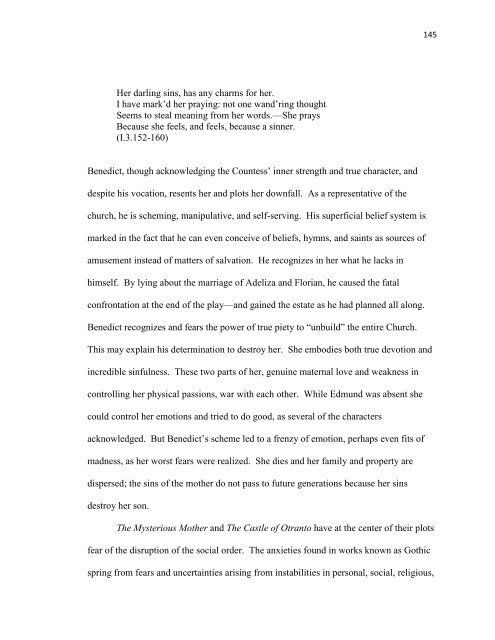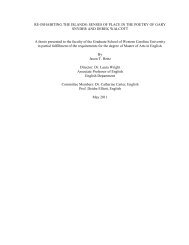SUMMERS, KAREN CRADY, Ph.D. Reading Incest - The University ...
SUMMERS, KAREN CRADY, Ph.D. Reading Incest - The University ...
SUMMERS, KAREN CRADY, Ph.D. Reading Incest - The University ...
You also want an ePaper? Increase the reach of your titles
YUMPU automatically turns print PDFs into web optimized ePapers that Google loves.
145<br />
Her darling sins, has any charms for her.<br />
I have mark’d her praying: not one wand’ring thought<br />
Seems to steal meaning from her words.—She prays<br />
Because she feels, and feels, because a sinner.<br />
(I.3.152-160)<br />
Benedict, though acknowledging the Countess’ inner strength and true character, and<br />
despite his vocation, resents her and plots her downfall. As a representative of the<br />
church, he is scheming, manipulative, and self-serving. His superficial belief system is<br />
marked in the fact that he can even conceive of beliefs, hymns, and saints as sources of<br />
amusement instead of matters of salvation. He recognizes in her what he lacks in<br />
himself. By lying about the marriage of Adeliza and Florian, he caused the fatal<br />
confrontation at the end of the play—and gained the estate as he had planned all along.<br />
Benedict recognizes and fears the power of true piety to “unbuild” the entire Church.<br />
This may explain his determination to destroy her. She embodies both true devotion and<br />
incredible sinfulness. <strong>The</strong>se two parts of her, genuine maternal love and weakness in<br />
controlling her physical passions, war with each other. While Edmund was absent she<br />
could control her emotions and tried to do good, as several of the characters<br />
acknowledged. But Benedict’s scheme led to a frenzy of emotion, perhaps even fits of<br />
madness, as her worst fears were realized. She dies and her family and property are<br />
dispersed; the sins of the mother do not pass to future generations because her sins<br />
destroy her son.<br />
<strong>The</strong> Mysterious Mother and <strong>The</strong> Castle of Otranto have at the center of their plots<br />
fear of the disruption of the social order. <strong>The</strong> anxieties found in works known as Gothic<br />
spring from fears and uncertainties arising from instabilities in personal, social, religious,
















